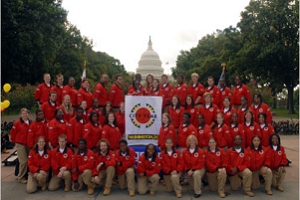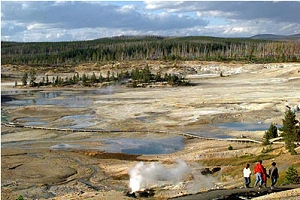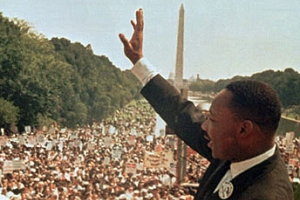America in context
Volunteerism Is Integral Part of U.S. Culture

University students represent a large and growing source of the nation's volunteers, according to the Corporation for National and Community Service, an independent federal agency that provides grants and other support to volunteer organizations throughout the country.
The number of American university students who volunteer for community service projects in the United States has risen nearly 20 percent since 2002, according to a new study. It found that three in 10 university students, or 3.3 million people, volunteered in 2005 – a gain of 600,000 students above the 2.7 million reported in 2002.
On campuses and in the community, university students are participating in a range of volunteer service activities such as tutoring and mentoring children, raising funds for worthy causes and helping their fellow citizens recover from hurricanes and other natural disasters, including deadly hurricanes Katrina and Rita in 2005.
Tutoring and mentoring are the most popular volunteer activities on university campuses, followed by fundraising and preparing, distributing and serving food. In 2005, nearly 32 percent of university student volunteers worked at educational or youth services organizations, and 24 percent worked at religious organizations. Other students volunteered at organizations ranging from sports and cultural groups to those specializing in international issues, public safety, environment and health care.
The Corporation for National and Community Service predicts service will continue to flourish in the United States. It estimates 5 million students will be engaged in volunteerism by 2010. The full text of College Students Helping America (PDF, 27 pages) and a press release are available on the Corporation for National and Community Service Web site.
Volunteerism Is Integral Part of U.S. Culture
Volunteering is “built into the fabric of who we are,” says Desiree Sayle, director of the USA Freedom Corps, a White House initiative to expand community service throughout America. Most Americans believe “that there is an obligation, because of the freedoms that we enjoy, to give something back,” said Sayle, who noted that more than 61 million Americans volunteered for charitable and national service organizations in 2006. This includes volunteering overseas through organizations such as the Peace Corps and Volunteers for Prosperity. Volunteerism has expanded since the terrorist attacks of September 11, 2001, said Sayle. “The highest growth rate is for youth age 16-24, and we want to do more to encourage volunteer service within that population.”
Volunteerism is “a major cultural phenomenon in the U.S.,” said Arthur Brooks, associate professor of public administration and director of the nonprofit studies program at Syracuse University’s Maxwell School of Public Affairs. About half of all Americans participate in volunteer activities each year, including those who volunteer informally in their communities as well as the 61 million who contribute their time directly to charitable and religious organizations, he told USINFO. In addition, roughly 75 percent of Americans donate money to charity each year.
Video feature: I helped build it Through 30 years and 200,000 houses, Habitat for Humanity has been building homes, and lives, in America and around the world.
“The attitudes we have about the government and the fact that the U.S. is a very religious country … keep our giving and volunteering very strong compared with other countries,” Brooks said.
Many Americans believe that “responsibility for service starts with individuals and not with government,” he said. Societies that rely more on the government for social services and are less religious have lower rates of volunteering and giving, he added. “If people stopped giving and volunteering, how much would the government pick up? Probably a lot, but that’s not how we choose to govern ourselves in the U.S.,” Brooks said. The United States is stronger and more prosperous because of its tradition of volunteerism and giving, he said. “When people give, they actually see returns in their happiness and health, and they behave more effectively as citizens. This aggregates up to the community and the national level.”
American Democracy Built on Volunteer Spirit
Volunteerism continues to be crucial to a functioning democracy, American authors Susan Ellis and Katherine Campbell say in their book By the People.
Civic voluntary activity long has been a noteworthy aspect of American society. Volunteers helped shape the nation and continue to contribute to its prosperity. The more citizens involve themselves as volunteers, "the closer they come to making the ideals of democracy real," the authors, who are experts in volunteerism, say.
American volunteerism includes such activities as serving on community committees, raising funds for worthy causes, working to preserve historical landmarks, serving on fire and ambulance crews and leading youth groups.Within American institutions, professions and social events, the impact of volunteerism has been noteworthy.
Volunteerism is a "method of accomplishing a shared social goal" that has been adopted quickly by "every new wave of immigrants," Ellis and Noyes say. "European settlers of the new American colonies all had the same priority: survival. ... Cooperation frequently meant the difference between life and death," the authors say. To achieve this cooperation, members of every new community had to assume a variety of roles covering every aspect of need. They adapted the institutions and beliefs they brought with them into new models.
The settlers discovered that this mutual service did more than simply provide for survival; it also "provided social outlets and promoted a sense of community," the authors say. The new system came to define much about American life. Without a diversified government, many aspects of society at the time were handled by individual volunteers or voluntary societies. As settlements grew, they adopted forms of government that strengthened mutual ties and depended on individual service. Books were rare, so personal collections were shared, and often donated to the community. Historical documents often were combined with the book collections, creating local libraries and museums. As cities appeared, many services eventually were taken over by the government. But in the beginning, they were done by interested citizens.
Volunteers also delivered services in areas such as education, crime management, emergency response, newspapers, mail delivery and caring for the poor. As Americans pushed westward into new territories, families traveled in groups for safety. These "mobile communities" divided tasks among their members, with each person’s contributions being important to the success of the entire group. This spirit carried over when they reached new lands. Experimenting with new approaches to community organization, settlers developed "democratic governing codes" built on mutual aid and individual volunteer service -- codes that later formed the basis for state constitutions, the authors say. As the United States grew, groups formed to address problems of newly arrived immigrant groups.
Many notables in American history are associated with voluntary efforts or philanthropic development. They include Benjamin Franklin, who in the 18th century founded one of the countrys first libraries, the first volunteer fire company and the first zoo; Clara Barton, who worked on the battlefields to help the U.S. Civil War wounded then founded the American National Red Cross, adding disaster service to the European model; and Jane Addams, whose settlement house movement in the late 19th century addressed problems of the urban poor and led to significant social reforms. The support the first settlers received from the local American Indian tribes is formalized in many of America’s Thanksgiving traditions.
Incorporating many traditions, addressing new challenges, learning from working together -- America has developed in an environment that encourages innovation and helping one another. It continues to exemplify the best of what it means to participate in a democratic society.
By Martha Paluch, Louise Fenner and Robin Yeager - USINFO Staff Writers
Recently on America in context
Sharing Our National Park System With the World
 The United States launched a conservation ethic with establishment of Yellowstone National Park in 1872 and today manages some 34 million hectares in parks and 36.4 million hectares in wildlife refuges. The country is committed to helping other countries share in the conservation and economic benefits of land and wildlife preservation.
The United States launched a conservation ethic with establishment of Yellowstone National Park in 1872 and today manages some 34 million hectares in parks and 36.4 million hectares in wildlife refuges. The country is committed to helping other countries share in the conservation and economic benefits of land and wildlife preservation.
Religion in America
 One of the bedrock principles of the United States is religious liberty and the separation of church and state. At the time the Republic was founded more than two centuries ago, the overwhelming majority of Americans were Christians. Since that time, however, the United States has become the worlds most religiously diverse society, especially during the last three decades.
One of the bedrock principles of the United States is religious liberty and the separation of church and state. At the time the Republic was founded more than two centuries ago, the overwhelming majority of Americans were Christians. Since that time, however, the United States has become the worlds most religiously diverse society, especially during the last three decades.
Protecting Minority Rights
 "I have a dream that my four little children will one day live in a nation where they will not be judged by the color of their skin but by the content of their character."
"I have a dream that my four little children will one day live in a nation where they will not be judged by the color of their skin but by the content of their character."
-- Dr. Martin Luther King, Jr.
March on Washington Speech, August, 1963